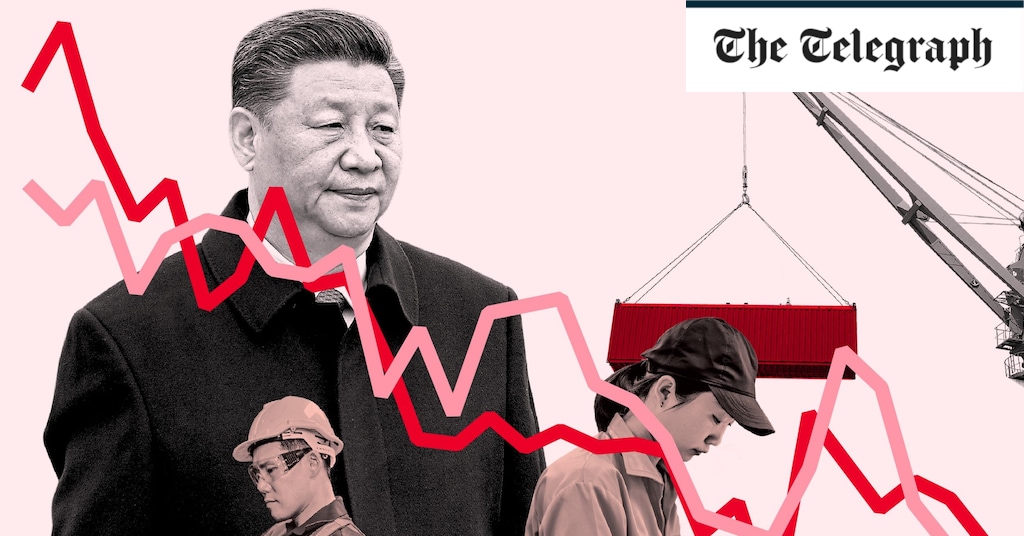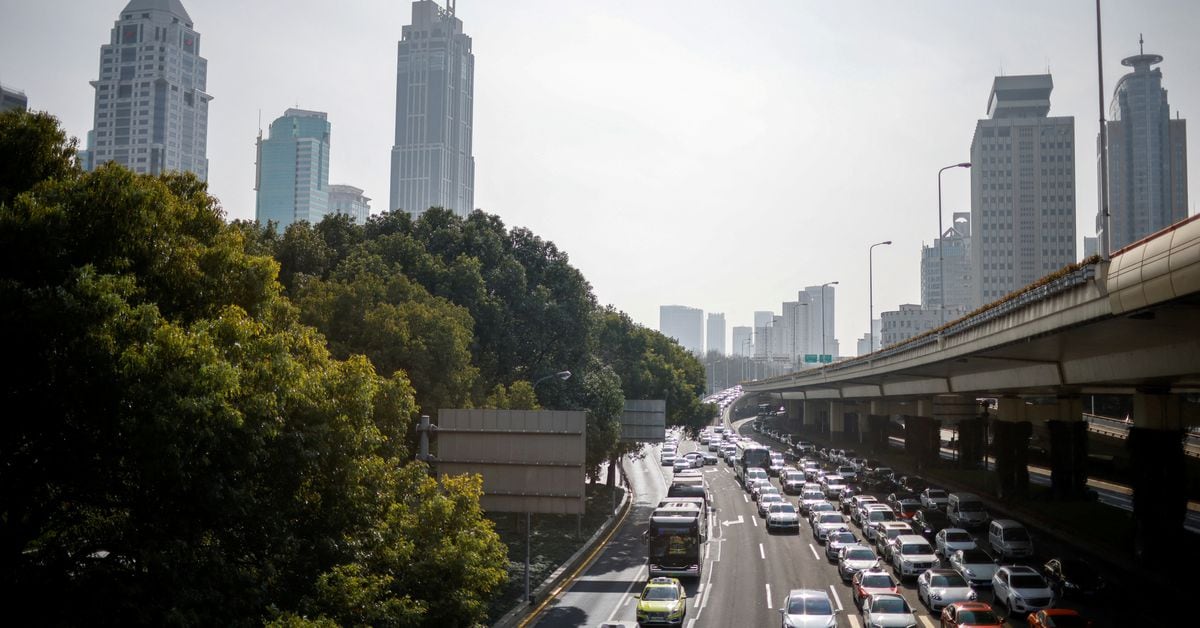F-22Raptor
ELITE MEMBER

- Joined
- Jun 19, 2014
- Messages
- 16,980
- Reaction score
- 3
- Country
- Location
A new social movement emerged during the pandemic in China. Tang ping – “lie flat” – became a widespread term for young professionals resisting the pressures of the rat race in a flagrant denial of President Xi Jingping’s “Chinese dream”.
“They’ve lost their optimism about where China is headed and I think with good reason,” says George Magnus, an independent economist and author of Red Flags: Why Xi’s China is in Jeopardy.
China’s Communist Party panicked. President Xi publicly condemned the movement.
Yet when it comes to economic data, Chinese policymakers might now prefer the concept of lying flat. The nation’s trade figures are doing something much more flagrant – nosediving.
China’s exports fell for the third month in a row in July, plunging by 14.5pc year-on-year in dollar terms. This was the biggest drop since February 2020, when the pandemic began.
Meanwhile, imports fell for the fifth month in a row, dropping by 12.4pc.
Consumption is so low that the economy fell into deflation in July for the first time since the start of 2021. China’s consumer prices index fell by 0.3pc year-on-year, after 0pc growth in June. An anticipated resurge in spending has simply not happened. Factory gate prices fell by 4.4pc.
The export figures are symptomatic of a slump in global demand, particularly in Western nations that are grappling with soaring interest rates and high inflation.
But analysts warned that the numbers are likely to fall further as rising geopolitical tensions, tariffs, the fallout from China’s zero-Covid policy and Xi’s increasingly authoritarian regime push international companies and investors away from China – just as the nation’s domestic economy tanks.
“Xi Jingping doesn’t understand economics. That is the problem,” says Steve Tsang, director of the SOAS China Institute.
China was once known as the workshop of the world. Yet “Made in China” is now in decline.
Shipments to the US fell by 23.1pc in July. A flurry of other markets including Taiwan, Japan and the EU also recorded double digit drops.
Direct investment liabilities – a key measure of foreign direct investment (FDI) in China – plummeted 87pc to $4.9bn between April and June. This was the lowest amount in any three-month period since at least 1998, according to the State Administration of Foreign Exchange.
The true investment numbers are in fact likely to be far worse, says Magnus, as official figures include Hong Kong.
These figures are a precursor for future trade. Foreign companies operating in China account for around 30pc of China’s exports – and they are slowly but steadily starting to move operations elsewhere.
Tsang says: “Companies are beginning to see that investments in China are subjected to all kinds of restrictions that they were not used to in the last 20 years.”
Foreign companies in China have to give a Communist Party secretary a seat on their board of directors. Communist Party agents have always operated in Western multinationals, but previously they lobbied for the company, says Tsang.
“Now that Xi Jingping is tightening party control and requiring party secretaries to do more for the party in the companies than the other way around. It has become more of an enforcement role,” he says.
At the same time, foreign companies have witnessed the Chinese government’s extreme, authoritarian policy swings around Covid restrictions.
“The zero Covid policy flip flop created a huge amount of uncertainty for investments in China,” says Tsang.
“Companies don’t care what politicians have to say. Companies care about their secure supply, their reputation, their businesses. And the Chinese have made investments more risky.
“Three to five years ago, Western companies looked at investments in China as a sure bet. If you didn’t have China operations, everyone asked you why not. Now, you probably have to explain why you’re planning to expand in China.”
A flurry of big Western companies are already trying to diversify their supply chains. Apple is making plans to move some of its manufacturing out of China. Samsung has already shifted significant chunks of its supply chain away. Siemens is looking for factory sites in Indonesia, Vietnam and Thailand.
Magnus says: “Bit by bit, trade controls, export controls, foreign direct investment, scrutiny, will chip away at China’s status as the workshop of the world over the decade.”
The drop in investment in China will have widespread implications.
“The reason it’s really significant is that that is an important way that China gets technology,” says Ken Rogoff, chair of international economics at Harvard University and former chief economist at the International Monetary Fund.
“The foreign companies build plants and they copy them. That has been the Chinese model. The slowdown in FDI will also imply a slowdown in innovation.”
Barriers have come up on both sides. The Trump administration introduced new tariffs on Chinese goods. The Biden administration has maintained these tariffs and the US has also introduced restrictions on China’s access to advanced chips.
Almost 70pc of all imports to the US from China now have an average tariff of 20pc, according to an analysis by the Peterson Institute for International Economics, up from 3pc before the trade war began.
China is also becoming less competitive as a production location – it is more expensive than it was 20 years ago. Its labour force is shrinking as its population ages – a demographic transition that is unusual in an emerging economy and caused in part by China’s former one child policy.
“That is going to push wages up even further,” says Magnus. “It’s not going to happen overnight, but virtually every company now has a China plus one strategy, or China plus two, meaning they keep their factories in China, but their new factories will be in Vietnam, or Indonesia, or India. So China’s not getting growth,” says Rogoff.
One in five UK importers have made alterations to their supply chains because of geopolitical pressures, particularly in relation to China, according to research by the Institute of Directors. A further 15pc are considering making alterations.
The fall in exports has come at a tricky time for China. Real estate and infrastructure were previously China’s internal economic growth engines. But now these projects have hit saturation and real estate is in a prolonged downturn.
“Exports is their go-to strategy if they can’t rely on housing,” says Rogoff. “It is just one more sign of many that China is in for a sustained slowdown.”
He expects economic growth in China will slump to between 2pc and 3pc through the next decade – far below levels enjoyed in recent decades and well below Xi’s 5pc target this year.
China’s growth rate already halved between the 2000s and the 2010s, falling from about 10pc to 5pc, says Magnus. “Now I think it is halving again.”
The drop in imports is the biggest warning sign for China’s economy, he argues. Imports in the first seven months of 2023 were down 7.5pc, compared to the same period in 2022. That is a sign that the domestic economy is weak.
Youth unemployment has soared and the property market is in a prolonged downturn. Both of these factors are weighing on consumption.
“Most Chinese people’s long-term savings are invested in real estate. People are holding onto the properties and they are only taking paper losses, but it has a huge impact on the feelgood factor,” says Tsang.
The Xi administration is struggling to find ways to boost demand while China’s working age population is in sharp decline. All the traditional levers it would look to pull are no longer working.
“They are running into the same problems that Japan did and the Soviet Union did,” says Rogoff. “You just can’t keep building houses that nobody lives in.”

 www.telegraph.co.uk
www.telegraph.co.uk
“They’ve lost their optimism about where China is headed and I think with good reason,” says George Magnus, an independent economist and author of Red Flags: Why Xi’s China is in Jeopardy.
China’s Communist Party panicked. President Xi publicly condemned the movement.
Yet when it comes to economic data, Chinese policymakers might now prefer the concept of lying flat. The nation’s trade figures are doing something much more flagrant – nosediving.
China’s exports fell for the third month in a row in July, plunging by 14.5pc year-on-year in dollar terms. This was the biggest drop since February 2020, when the pandemic began.
Meanwhile, imports fell for the fifth month in a row, dropping by 12.4pc.
Consumption is so low that the economy fell into deflation in July for the first time since the start of 2021. China’s consumer prices index fell by 0.3pc year-on-year, after 0pc growth in June. An anticipated resurge in spending has simply not happened. Factory gate prices fell by 4.4pc.
The export figures are symptomatic of a slump in global demand, particularly in Western nations that are grappling with soaring interest rates and high inflation.
But analysts warned that the numbers are likely to fall further as rising geopolitical tensions, tariffs, the fallout from China’s zero-Covid policy and Xi’s increasingly authoritarian regime push international companies and investors away from China – just as the nation’s domestic economy tanks.
“Xi Jingping doesn’t understand economics. That is the problem,” says Steve Tsang, director of the SOAS China Institute.
China was once known as the workshop of the world. Yet “Made in China” is now in decline.
Shipments to the US fell by 23.1pc in July. A flurry of other markets including Taiwan, Japan and the EU also recorded double digit drops.
Direct investment liabilities – a key measure of foreign direct investment (FDI) in China – plummeted 87pc to $4.9bn between April and June. This was the lowest amount in any three-month period since at least 1998, according to the State Administration of Foreign Exchange.
The true investment numbers are in fact likely to be far worse, says Magnus, as official figures include Hong Kong.
These figures are a precursor for future trade. Foreign companies operating in China account for around 30pc of China’s exports – and they are slowly but steadily starting to move operations elsewhere.
Tsang says: “Companies are beginning to see that investments in China are subjected to all kinds of restrictions that they were not used to in the last 20 years.”
Foreign companies in China have to give a Communist Party secretary a seat on their board of directors. Communist Party agents have always operated in Western multinationals, but previously they lobbied for the company, says Tsang.
“Now that Xi Jingping is tightening party control and requiring party secretaries to do more for the party in the companies than the other way around. It has become more of an enforcement role,” he says.
At the same time, foreign companies have witnessed the Chinese government’s extreme, authoritarian policy swings around Covid restrictions.
“The zero Covid policy flip flop created a huge amount of uncertainty for investments in China,” says Tsang.
“Companies don’t care what politicians have to say. Companies care about their secure supply, their reputation, their businesses. And the Chinese have made investments more risky.
“Three to five years ago, Western companies looked at investments in China as a sure bet. If you didn’t have China operations, everyone asked you why not. Now, you probably have to explain why you’re planning to expand in China.”
A flurry of big Western companies are already trying to diversify their supply chains. Apple is making plans to move some of its manufacturing out of China. Samsung has already shifted significant chunks of its supply chain away. Siemens is looking for factory sites in Indonesia, Vietnam and Thailand.
Magnus says: “Bit by bit, trade controls, export controls, foreign direct investment, scrutiny, will chip away at China’s status as the workshop of the world over the decade.”
The drop in investment in China will have widespread implications.
“The reason it’s really significant is that that is an important way that China gets technology,” says Ken Rogoff, chair of international economics at Harvard University and former chief economist at the International Monetary Fund.
“The foreign companies build plants and they copy them. That has been the Chinese model. The slowdown in FDI will also imply a slowdown in innovation.”
Barriers have come up on both sides. The Trump administration introduced new tariffs on Chinese goods. The Biden administration has maintained these tariffs and the US has also introduced restrictions on China’s access to advanced chips.
Almost 70pc of all imports to the US from China now have an average tariff of 20pc, according to an analysis by the Peterson Institute for International Economics, up from 3pc before the trade war began.
China is also becoming less competitive as a production location – it is more expensive than it was 20 years ago. Its labour force is shrinking as its population ages – a demographic transition that is unusual in an emerging economy and caused in part by China’s former one child policy.
“That is going to push wages up even further,” says Magnus. “It’s not going to happen overnight, but virtually every company now has a China plus one strategy, or China plus two, meaning they keep their factories in China, but their new factories will be in Vietnam, or Indonesia, or India. So China’s not getting growth,” says Rogoff.
One in five UK importers have made alterations to their supply chains because of geopolitical pressures, particularly in relation to China, according to research by the Institute of Directors. A further 15pc are considering making alterations.
The fall in exports has come at a tricky time for China. Real estate and infrastructure were previously China’s internal economic growth engines. But now these projects have hit saturation and real estate is in a prolonged downturn.
“Exports is their go-to strategy if they can’t rely on housing,” says Rogoff. “It is just one more sign of many that China is in for a sustained slowdown.”
He expects economic growth in China will slump to between 2pc and 3pc through the next decade – far below levels enjoyed in recent decades and well below Xi’s 5pc target this year.
China’s growth rate already halved between the 2000s and the 2010s, falling from about 10pc to 5pc, says Magnus. “Now I think it is halving again.”
The drop in imports is the biggest warning sign for China’s economy, he argues. Imports in the first seven months of 2023 were down 7.5pc, compared to the same period in 2022. That is a sign that the domestic economy is weak.
Youth unemployment has soared and the property market is in a prolonged downturn. Both of these factors are weighing on consumption.
“Most Chinese people’s long-term savings are invested in real estate. People are holding onto the properties and they are only taking paper losses, but it has a huge impact on the feelgood factor,” says Tsang.
The Xi administration is struggling to find ways to boost demand while China’s working age population is in sharp decline. All the traditional levers it would look to pull are no longer working.
“They are running into the same problems that Japan did and the Soviet Union did,” says Rogoff. “You just can’t keep building houses that nobody lives in.”

How the end of ‘Made in China’ is crippling the world’s second largest economy
Once known as the workshop of the world, China’s slump will have widespread effects







